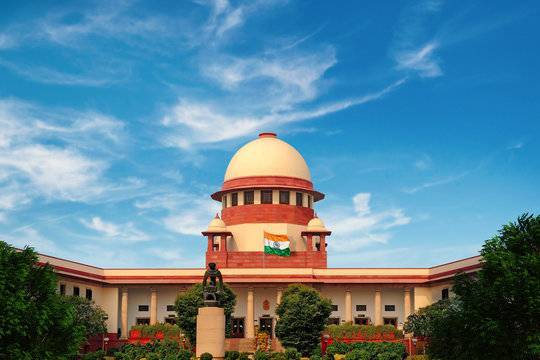
GAG LAWYERS -
GROVER & GROVER ADVOCATES

GAG LAWYERS -
GROVER & GROVER ADVOCATES

Immigration Lawyer, Immigration law is a branch of law that deals with the rights, duties, and obligations of people who are not citizens of a particular country. It covers a wide range of topics, from the rights of immigrants to enter a country and remain in it, to citizenship and naturalisation, to the deportation and removal of immigrants.
It also regulates the employment of foreign workers and the ability of immigrants to access social services. Immigration law is an important tool for ensuring that immigrants are treated fairly and that they have access to the same rights and opportunities as citizens. Immigration law is a complex and ever-changing area of law that governs the legal process of individuals entering, living in, and leaving a country. It is the branch of law that deals with the rights, duties, and obligations of immigrants to a country, as well as their ability to gain citizenship or other legal status in that country.
Immigration law also covers issues related to refugees and asylum seekers. Understanding immigration law is essential for anyone who is considering living or working abroad.
Immigration law is the body of law that governs the movement of people across international borders. It deals with issues such as citizenship, visas, refugee status, and other matters related to individuals entering or leaving a country.
Immigration law also covers matters related to the rights and responsibilities of immigrants living in a certain country. With the global population on the rise, immigration law plays an important role in regulating migration and protecting people’s rights. This course provides a comprehensive introduction to the law of immigration, including topics like visas and citizenship, the law of refugee protection, and family reunification.
Jurisdiction and Decision-making International law is a body of law that governs the conduct of independent states. International law deals with issues such as war and peace, trade relations, treaties, dispute settlement, and other matters involving more than one state. With the global population on the rise, international law plays an important role in regulating international migration and protecting people’s rights. This course provides an introduction to international law for students who are not familiar with its concepts or terminology.

Immigration law in India is an important part of the country’s legal system. It governs the entry, stay, and exit of foreign nationals into and from India. As such, any violation of these laws can lead to charges and punishments. This article will discuss the various charges, penalties, and punishments associated with immigration law in India. It will also provide an overview of some of the most common cases that are subject to these laws.
Finally, it will look at how immigrants can protect themselves from possible violations of these laws. Immigration law in India There are three primary kinds of immigration laws in India. They are entry, stay, and exit. These categories regulate the rights of foreign nationals entering and exiting the country for a variety of purposes.
The entry category governs the right to enter India and stay within it, while the stay category handles any time that an individual spends within Indian territory. Lastly, there is a fully functioning exit system that determines when a person can leave or be forcibly removed from Indian soil based on their violations of immigration laws. The following are some charges that can result from violating these three categories:
• Admission of an Unlawful Immigrant: This charge applies to any individual who enters India without permission. This can also apply to individuals who enter the country for illicit purposes.
• Detention of an Unlawful Immigrant: When a person is taken into custody and held within a detention facility, they are subjected to this charge. The person in custody may be released on bail or be ordered deported from the country before this charge can be applied against them.
• Failing to Depart India on Time: This occurs when an individual is ordered by a court or government authority to leave the country and they do not.
• Failing to Pay the Restitution: This occurs when a person who has been ordered to pay restitution for crimes committed against another fails or refuses to do so.
• Failure to Appear for Treatment: This occurs when a person who has been ordered to undergo treatment for substance abuse, mental health, or emotional disturbance fails or refuses to do so.
• Violation of a term or condition of probation: A violation is conduct that violates the terms or conditions established by the court in granting probation.

Immigration law in India is complex and often confusing. To ensure that your legal rights are protected, it is important to understand the procedure for filing a case related to immigration law. This article will outline the steps involved in filing a case related to immigration law in India, from finding an attorney to submitting the required paperwork.
We will also discuss how to prepare for a successful outcome and what resources are available for those seeking assistance with their case. By understanding the process of filing a case related to immigration law in India, you can ensure that your legal rights are properly protected. Filing a case related to immigration law in India can be a daunting task. It is important to understand the procedures and legalities involved before beginning the process.
This article will provide an overview of the steps that need to be taken when filing a case related to immigration law in India. It will discuss topics such as filing documents, selecting a lawyer, obtaining legal advice, and understanding court proceedings. By following these steps, individuals can ensure that their case is handled properly and efficiently.
Filing Documents to be filed in Indian courts include affidavits, complaints, and testimonies. For a complaint or testimony to be considered by the court, it must contain specific details that acknowledge the allegations made by the plaintiff and should have been signed under oath.
The affidavit is a written declaration of facts that is usually offered as evidence in cases related to immigration law. If an individual wishes to file an affidavit, they must first file a notice with the appropriate court stating their intention to do so and pay a fee if required. Once this notice has been filed with the appropriate court, individuals can start preparing their affidavit.
f an individual is interested in filing a petition for habeas corpus, they must file with the court a notice of intention to file and pay the appropriate fee. There is no fee for filing a notice of intention to file and paying the appropriate fee. This is done by filing with a court either a paper notice or an electronic notice through the website of the court.
If an individual does not intend to file for habeas corpus, they should use their paper notice to file. If they do intend on petitioning for habeas corpus, then they are required to use their electronic form that must be filed through the court’s website.

Immigration law is a complex and ever-changing area of law requiring the expertise of an experienced lawyer. Immigration lawyers who specialise in immigration law are well-versed in the rules and regulations that govern immigration as well as how to navigate the legal system to help their clients achieve their immigration goals. Immigration lawyers provide invaluable advice to those seeking to enter or remain in a foreign country, helping them understand their rights and responsibilities under the law.
Immigration lawyers also provide assistance with visa applications, family reunification cases, deportation hearings, asylum cases, and more. By understanding the nuances of immigration law and staying up-to-date on relevant changes in policy and procedure, immigration lawyers can ensure their clients have access to justice.
Immigration law is a complex and ever-changing area of law requiring the expertise of an experienced lawyer. Lawyers who specialise in immigration law are well-versed in the rules and regulations that govern immigration as well as how to navigate the legal system to help their clients achieve their immigration goals. Immigration lawyers provide invaluable advice to those seeking to enter or remain in a foreign country, helping them understand their rights and responsibilities under the law.
They also provide assistance with visa applications, family reunification cases, deportation hearings, asylum cases, and more. By understanding the nuances of immigration law and staying up-to-date on changes, these professionals can provide valuable guidance when navigating the complexities of immigration. Some non-lawyers also serve as agents for asylum claimants, foreign students, and undocumented immigrants.

Filing a case related to immigration law in India requires the submission of several documents. These documents are necessary for the court to evaluate the case and make a decision. The documents required for a case related to immigration law in India include proof of identity, proof of residence, evidence related to the immigration law violation, and any other supporting documents that can be used as evidence.
It is important for individuals filing a case related to immigration law in India to provide all relevant documents in order to ensure that their case is properly evaluated and decided upon. Filing a case related to immigrationn laww in India requires the submission of several documents. These documents are necessary for the court to understand the details of the case and make an informed decision.
The documents needed include proof of identity, proof of residence, passport or visa copies, and other relevant information. Additionally, applicants may be required to submit additional documents, such as affidavits or character references, depending on the specific circumstances of their case. By submitting these documents, applicants can ensure that their case is properly assessed by the court and that they receive a fair judgement.
1. a completed application form.
2. Passport-sized photographs.
3. Proof of identity, such as a birth certificate, driver’s licence, or passport
4. current address and contact information.
5. Proof of legal status, such as a green card, work visa, or permanent residence card
6. Financial documents, such as bank statements, pay stubs, and proof of income,
7. documents related to the immigration issue, such as proof of marriage for a spouse petition, 8. employment contracts, or evidence of criminal charges.
9. Affidavits from witnesses or other supporting documents
10. any applicable filing fees.

Grover & Grover, Advocates and Solicitors, is a law firm specialising in immigration law. They provide professional legal advice and representation to individuals and businesses looking to move abroad. The firm’s experienced attorneys are well-versed in the complexities of immigration law and can help clients navigate the process with confidence.
Through their expertise, they provide assistance with visa applications, appeals, deportation orders, family-based immigration cases, naturalisation applications, asylum claims, and more. With Grover & Grover’s comprehensive knowledge of immigration laws, they can help ensure that clients are able to make a successful transition to living in another country. The firm can also help clients who want to start a business abroad.
Our services cover all aspects of immigration law, including visas, permanent residency, citizenship applications, and more. With our help, we will ensure that your application process goes smoothly while ensuring your rights are protected at all times. With our help, we will ensure that your application process goes smoothly while ensuring your rights are protected at all times.

The Supreme Court and high courts have been important sources of lawmaking in cases related to immigration. These courts have issued many rulings that establish the rights of immigrants and determine their eligibility for certain benefits. In this article, we will discuss some of the popular cases related to immigration law that have been decided by the Supreme Court or high courts. We will look at their implications and how they may influence future policies on immigration.
Supreme Court of India:
1) M.P. Sharma vs. Satish Chandra, 1954: This case was a landmark judgement in relation to immigration law. The court held that a person who is not an Indian citizen cannot claim the right to move freely throughout the country.
2) Indra Sawhney v. Union of India, 1992: This case challenged the constitutional validity of the reservation policy of the Indian government. The court held that the reservation policy was valid as long as it was within the parameters of the Constitution.
3) Azad Hind Bank vs. Central Bank of India, 1998: This case was related to the issue of foreign citizens investing in India. The court held that a foreign citizen can invest in India, but the government of India has to approve it.
High Court of India:
1) Sherry Khan v. Union of India, 2006: This case was related to the issue of illegal migrants in India. The court held that illegal migrants should not be allowed to stay in India and should be deported to their country of origin.
2) Ramesh Kumar v. Union of India, 2012: This case was about the issue of granting visas to foreign nationals. The court held that the government of India has the right to grant or deny visas to foreign nationals.
3) Anil Kapoor vs. Union of India, 2018: This case was related to the issue of the deportation of foreign nationals. The court held that the government of India has the right to deport foreign nationals who are staying in India illegally.